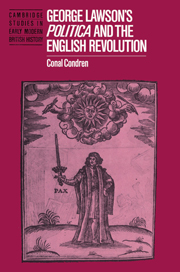Book contents
- Frontmatter
- Contents
- Preface
- Texts used and a concordance for the ‘Politica’
- List of abbreviations
- PART I Historiographical And Biographical Preliminaries
- PART II An Exposition Of Lawson's Politica
- PART III An Examination Of The Politica
- PART IV The Fate Of The Politica From The Settlement To The Glorious Revolution
- 11 Lawson and Baxter
- 12 Lawson and Humfrey
- 13 The Politica and the Allegiance Controversy
- 14 Aftermath
- PART V Conclusions
- Index
- Cambridge Studies in Early Modern British History
- Frontmatter
- Contents
- Preface
- Texts used and a concordance for the ‘Politica’
- List of abbreviations
- PART I Historiographical And Biographical Preliminaries
- PART II An Exposition Of Lawson's Politica
- PART III An Examination Of The Politica
- PART IV The Fate Of The Politica From The Settlement To The Glorious Revolution
- 11 Lawson and Baxter
- 12 Lawson and Humfrey
- 13 The Politica and the Allegiance Controversy
- 14 Aftermath
- PART V Conclusions
- Index
- Cambridge Studies in Early Modern British History
Summary
Lawson's appearance as something of an authority in the final stages of the settlement crisis was made possible because, as it were, a widely distributed apanage of terms and attitudes passed through him. In doing so it was his own inheritance which destroyed traces of his distinctive identity. As Atwood exemplifies, he was merged with one who was to become infinitely more famous. Brief reference to two more texts will take the whole matter of Lawson's fading visibility one stage further. In 1702 a pair of anonymous and frivolous tracts concerning the rights of women were printed. In the second of these the superiority of the male is reasserted. A series of what seem to be allusions to Lawson (when the author is in philosophical mood) prefigure an anecdote in which some apparently unemployed poets (‘a pert company of candidates for the muses’) rely on the authority of Lawson to subdue their landlady. Giving her ‘messes of morality and lectures out of Lawson concerning the degrees of sovereignty and the Rights of a Woman’, these loutish parodies of real majesty closely control the personal majesty of the ‘old maid’. Chauvinist or not, the author was probably hostile to the restrictive theories of government with which Lawson was associated; and manifestly a considerable familiarity with Lawson is assumed. Currency can have no better badge than inverted trivialisation.
- Type
- Chapter
- Information
- George Lawson's 'Politica' and the English Revolution , pp. 166 - 170Publisher: Cambridge University PressPrint publication year: 1990



